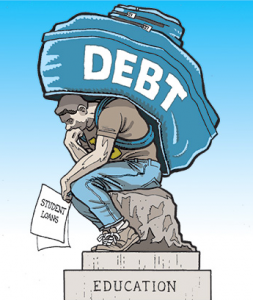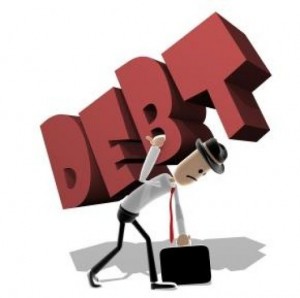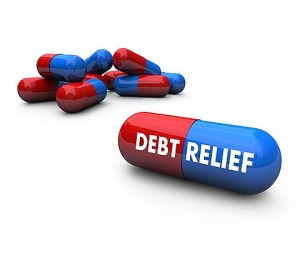May 24, 2012
 Many people think that consolidating debts is a quick and easy way to solve their debt problems. It is easy and quick to get the loan and set it up, but there are still many dangers involved if they haven’t fully thought it through.
Many people think that consolidating debts is a quick and easy way to solve their debt problems. It is easy and quick to get the loan and set it up, but there are still many dangers involved if they haven’t fully thought it through.
It happens all too often: John borrows $10,000 to consolidate his multiple credit card debts only to use his credit cards again when he feels the pinch. Before he knows it, John now has the $10k loan and a balance of $5k on his credit cards. He’s in more debt now than when he started.
To avoid this nasty debt cycle, you need to consider some important points before you make a decision. Here are the top 4 things you need assess:
- Do you spend more than you earn? A common reason for using a consolidation loan is to help with cash flow. But just like a vitamin supplement that will only help if you have a good diet to begin with, a consolidation loan will only help if your budget is cash flow positive. The worst thing you can do is take out a loan and they use your credit cards again when you feel the pinch.
- Can you afford the repayments? This comes after you consider your budget and based on that analysis, can you afford to repay the loan comfortably? The whole point of debt consolidation is to make the payment slighter lower and more affordable. If this isn’t the case, or you may struggle to meet the payments each month then you might need to look for another solution – like a debt management plan, for example.
- How long will the loan last? Sometimes, consolidating your debts to a lower monthly amount means you will pay for longer. This might be a positive if it means you aren’t struggling every month, but you need to be aware that you will be in debt for longer whereas most people are trying to get out of debt as soon as possible.
- How much will you repay in total? Another effect of paying the loan for longer is that the total repayment might be more than it would have been if you continued paying the previous amount. This might not be the case if you had high interest credit cards, and it gives you the more affordable repayment you might need, but you need to be aware that you might pay back more with a consolidation loan because it is taken over a longer period.
Hopefully these points will give you more information about whether a consolidation loan is right for your situation and you will know exactly what you’re signing up for.
They can be an excellent debt relief tool when used appropriately but many people think they are a magic bullet and get a nasty shock when they don’t change their spending habits or thinking and end up further in debt.
If you’ve taken out a consolidation loan in the past, share your experience with us in the comments below.
Tags:
budgeting,
Credit Cards,
debt,
economy,
financial planning,
money,
personal finance
May 22, 2012
 “The ability to pay your debt is important for your financial security. However, what happens if you are not able to make your payments? Succumbing to a disability could put you out of work for a long period of time. Your property could be destroyed in a bad storm before you finish paying for it. Credit card insurance could be something worth looking into.
“The ability to pay your debt is important for your financial security. However, what happens if you are not able to make your payments? Succumbing to a disability could put you out of work for a long period of time. Your property could be destroyed in a bad storm before you finish paying for it. Credit card insurance could be something worth looking into.
Credit Card Life Insurance
If you die, your credit balance will be paid off. This can help relieve your family of at least one of your debts upon your passing. Without insurance, your family will be asked to pay your debt for you. You should be aware that you may already be covered if you already have life insurance through another provider. Therefore, it may not be worth carrying.
Credit Card Disability Insurance
Those who become disabled will have their current balance paid off. Keep in mind that future purchases will not be covered under this policy. Also, you will need to carry a policy for any of the credit cards that you currently have. However, this may be a good policy to have if you are really concerned about your credit score.
Credit Card Property Damage Insurance
Items that are damaged or stolen will generally be covered under the terms of this type of policy. The downside to this coverage is that many different policies offer this coverage as well. Your homeowners policy will cover the cost of anything damaged or stolen from your property. Renters insurance will generally cover this type of damage if you rent an apartment. Avoid this extra coverage if at all possible.
Other Pitfalls Of Credit Card Insurance
There are a a few other pitfalls of credit card insurance policies. The biggest pitfall is that there are many exclusions. You really have to read the fine print before agreeing to a credit card insurance policy. Another pitfall is that you are almost conned into buying a policy. One common tactic is to offer you a free 30-day trial. However, it is very difficult to cancel the policy after the trial is over.
Do yourself a favour by avoiding credit card insurance if at all possible. There are plenty of other policies that will offer you the same coverage for less. Purchasing a life insurance policy should cover your credit card debt as well as other debts you leave behind. Private medical insurance should help you cover your bills if you are ever out of work due to a medical issue. In other words, there is already coverage available to you if you are ever sick or injured. Go with that instead.
Tags:
Credit Card,
debt,
financial planning,
insurance,
money
April 18, 2012
 Student loans, if not properly managed, can become a burden that devastates a young professional out of college. Defaulting on payments can ruin a burgeoning credit rating, and an inability to pay the loan at all can lead to years of bankruptcy. Any loan is a risk, and long term loans can have a draining effect on an individual. The question then is how to avoid potentially costly debt as the cost of higher education continues to rapidly increase?
Student loans, if not properly managed, can become a burden that devastates a young professional out of college. Defaulting on payments can ruin a burgeoning credit rating, and an inability to pay the loan at all can lead to years of bankruptcy. Any loan is a risk, and long term loans can have a draining effect on an individual. The question then is how to avoid potentially costly debt as the cost of higher education continues to rapidly increase?
Take Only What You Need
Avoid excess debt by calculating exactly how much you need to borrow in order to complete your schooling. By avoiding excess debt, you can keep the amount owed low and thus payments will be smaller and more manageable. Being frugal for four years can be the difference between good credit and defaulting.
Budget
A defined budget both during and after college can be beneficial in avoiding defaulting on payments. By maintaining the habit of operating within your means, and evaluating your income as such that you can make your payments and lead a normal life, you will know exactly how much you are paying and to what ahead of time. By sticking to a budget you will never accidentally miss a payment, while at the same time saving enough to cover any emergencies that have not been accounted for.
Credit Cards
As a general rule you do not want to stack debt upon debt. A common occurrence in today’s world is the living from month to month on the back of credit card debt, hoping that the next month will be the month where you finally “Catch up.” Credit cards are a money sink, the high amount of interest makes paying off the debt exceptionally hard, and missing a single payment can increase the interest. By accruing credit card debt, student loans become harder to pay, and more of your monthly income gets consumed in interest payments. Credit cards should be avoided as often as possible.
Be Timely and Maintain Records
Do not leave payments to the last minute. Stay on top of your debt, note all the payments, and keep track of what is owed. Maintaining an understanding of your debt is imperative if you intend to pay it off. Slacking off or avoiding keeping records can leave you at a loss when you need that information the most. Questions about when money was paid or received can go a long way toward avoiding a credit score mishap.
Keep Your Lender Informed
Changes in address and phone number can occur quite frequently. It is not enough to simply notify your local post office of the address change. By keeping your lender informed you will avoid possible missed payments due to a mailing error. Small errors can have large repercussions and it is wise, even if occasionally inconvenient to stay ahead of the curve when dealing with your personal finances and the parties involved with your fiscal well being.
Seek Help if Necessary
Admitting to financial problems is often shameful and difficult. The inability to pay one’s bills in a given month can create a cascade effect that can affect one’s finances for years. Though it is difficult, when financial problems present themselves it is best to seek assistance from friends or family if possible in order to avoid problems in the future. If such assistance cannot be obtained inform your lender and see if anything can be done to help.
Construct a Plan
Constructing a financial plan can help assess where one stands and how to achieve financial freedom in the future. A financial plan should carefully measure ones income against one’s expenses, and through such evaluation weed out unnecessary expenses. The plan should convey a solid idea of when debts will be cleared, and should be regularly adjusted as salary and expenses either increase or decrease. Constructing such a plan takes dedication and requires individuals to maintain solid records and be willing to extricate themselves from activities or purchases that can have an adverse effect on their budget. A financial plan can be a valuable tool in overcoming the difficulties of dealing with debt as one enters the workforce.
One of the advantages of student loans is their ability to help create good credit for young adults beginning their lives independent from their parents. The difficulty arises from the lack of knowledge regarding debt and debt management. Asking most college graduates to deal with debt is like asking a child to run before it can crawl. There are no solid foundations in place that educate young adults in the proper methods for budgeting, planning, and debt management. Therefore the impetus is upon the individual to seek out and find the resources that will make him or her better prepared for life after college.
Tags:
budgeting,
debt,
economy,
financial planning,
loans,
money,
personal finance,
student loans
April 2, 2012
 Are you looking for ways in which you can consolidate your credit cards? There are different methods to go about getting all of your credit card debts rolled into one monthly payment and each way works a little differently and is right for some people. You’ll want to know your complete financial situation and the various ways in which you can consolidate credit cards before you choose the method that is most appropriate for you. Once you choose a method, you’ll need to stick with it in order to be successful. Some may argue that these methods don’t work, but that’s most likely because the people gave up before they saw success. It’s the same idea as losing weight; as long as you faithfully cut back on your calories and exercise more, you’ll lose weight no matter which diet or exercise routine you do.
Are you looking for ways in which you can consolidate your credit cards? There are different methods to go about getting all of your credit card debts rolled into one monthly payment and each way works a little differently and is right for some people. You’ll want to know your complete financial situation and the various ways in which you can consolidate credit cards before you choose the method that is most appropriate for you. Once you choose a method, you’ll need to stick with it in order to be successful. Some may argue that these methods don’t work, but that’s most likely because the people gave up before they saw success. It’s the same idea as losing weight; as long as you faithfully cut back on your calories and exercise more, you’ll lose weight no matter which diet or exercise routine you do.
One of the easiest, yet more risky, ways to consolidate debt it to use balance transfer credit cards. Many credit card companies offer anywhere from three to eighteen months of 0% interest on balance transfers, so you could take out a card with a 12 month 0% interest rate on balance transfers, move your old debt to the new card. Instead of paying hundreds in interest, all of your payments would go directly to the balance and you’d pay it off much sooner. The risky part of this method comes into play if you can’t get the debt paid off before your interest free grace period ends. Also, you may have more debt than credit limit, in which case you’d have to do this in phases, using a different card each time. It takes some planning, but the rewards are great!
Another way to consolidate debt it to take out a personal loan or, if you are a homeowner, take out a line of credit on your home. These ways carry some risk if you aren’t sure you’ll be able to make the payments because your car, home or other valuable belongings are being held on the line and would be taken from you if you default on your loan. Additionally, if your credit score isn’t good, you’ll pay a higher interest rate.
A third option is to choose credit counseling services which offer guidance by trained professionals. They’ll walk you through the process and help you with getting lower pay offs or interest rates from collectors, manage all of the payments. You simply need to work with them to give them all of your credit card debt information and then send them a monthly payment. They will do the rest of the work for you. To get on with the process of consolidating your cards, head over to consolidatecreditcardebt.net now and start saving hundreds, if not thousands, of dollars in interest. Don’t put it off until tomorrow or next week, do it now so that you can be living a debt free life even sooner than you ever dreamed possible!
Tags:
credit,
Credit Card,
Credit Card Debt,
credit card debt settlement,
debt,
Financial plannaing,
personal finance
March 29, 2012
 In today’s world, people cannot do without using credit cards. The payment for almost every item that we buy and every service that we use can be made using credit cards. People often use their card to purchase thing which are out of their budget, thinking that they will pay off the card balance in due course. However, such kinds of plans often do not materialize as people often face tough financial situations. In the current economic scenario, many people do not earn enough money to sustain their livings and make credit card payments at the same time. Thus, their debt increases and they often look for effective ways through which they can obtain credit card debt relief.
In today’s world, people cannot do without using credit cards. The payment for almost every item that we buy and every service that we use can be made using credit cards. People often use their card to purchase thing which are out of their budget, thinking that they will pay off the card balance in due course. However, such kinds of plans often do not materialize as people often face tough financial situations. In the current economic scenario, many people do not earn enough money to sustain their livings and make credit card payments at the same time. Thus, their debt increases and they often look for effective ways through which they can obtain credit card debt relief.
Getting relief from credit card debt is certainly not an easy task and people need to try their best and consolidate their credit card bills, and pay them off as soon as possible. The best thing to do is to opt for credit card bill consolidation loans which are offered by different financial institutions (lenders). These loans can assist people in effectively clearing their credit card debt in a short span of time. Such loans are offered by most financial institutions and the applicants do not need to own a house or provide any sort of collateral to get these loans.
These loans can be unsecured against the payment of a high rate of interest and no collateral needs to be produced. Some people might think as to why they should opt for a loan with high interest rate for paying off their credit card debt. The reason is that, the interest rate charged for debt consolidation loans (even unsecured loans) is way lower than the interest rates charged on the credit cards. Hence, people can avail of these loans and pay off their credit card dues.
Reaching a settlement agreement is another way through which people can get relief from their credit card debts. There are many professional agencies or companies which can be hired to act as a 3rd party mediator between the borrowers and the banks. These companies will not only help in the settlement process but they can also help the borrowers in applying for loans for debt consolidation. They charge a nominal amount of fee for their services and can assist the borrowers in many ways, in order to help them in getting relief from debt.
In order to achieve credit card debt relief, people will need to make a conscious effort and try their best to pay off the credit card dues in time. They can benefit a lot from hiring the services of these professional agencies which have a lot of experience in this field, have dealt with many such cases, and are aware of all the legal ways through which people can consolidate their debt, make regular payments and improve their credit history. Before choosing any such agency, it is important to do a thorough check about their credibility to make sure that they are genuine.
Tags:
credit,
Credit Card Debt,
debt,
Debt Relief,
economy,
financial planning
 Many people think that consolidating debts is a quick and easy way to solve their debt problems. It is easy and quick to get the loan and set it up, but there are still many dangers involved if they haven’t fully thought it through.
Many people think that consolidating debts is a quick and easy way to solve their debt problems. It is easy and quick to get the loan and set it up, but there are still many dangers involved if they haven’t fully thought it through.




Recent Comments